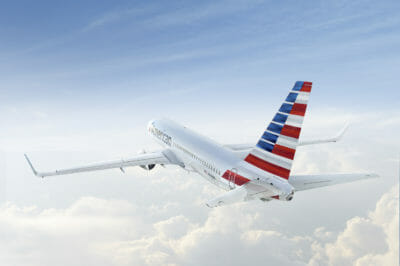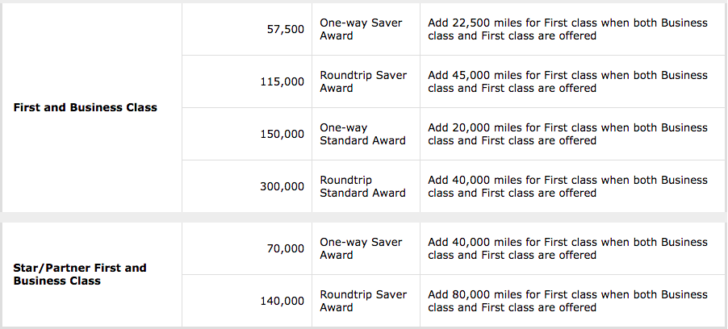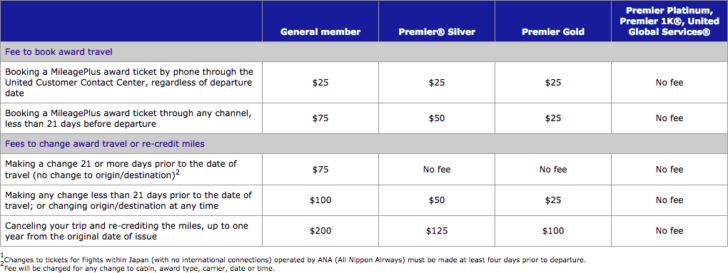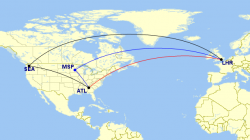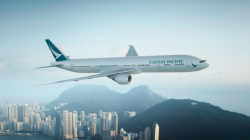After previously discussing award routing rules on American Airlines and Alaska Airlines, I’ve been putting off a similar post on United Airlines. Why? There’s not a whole lot to say — United generally lets you do whatever you want as long as you don’t get too crazy.
Some people do like to get crazy, perhaps because for a long time United’s policies stood out as exceptionally generous along with easy transfers from Chase Ultimate Rewards. (It’s no longer as easy to earn Ultimate Rewards, and the competition have relaxed their routing rules a bit.)
Table of Contents and Related Posts
I’ve tried to focus on the few things you need to know if you’re redeeming United miles. But for a walk on the wild side, Travel Is Free has an excellently detailed post on some of the more complex aspects of United’s award rules. Who knew that flying onward to Japan could help you shave 10,000 miles off a trip to Africa?
Rule #1: One-Way Awards and Two Open Jaws Permitted
Like many airlines today, United is pretty flexible when it comes to allowing one-way awards and open jaws. One-way awards are half the price of a round-trip award so you won’t be penalized if you want to mix-and-match.
You can also book awards with one or two open jaws, where you arrive and depart from different airports in the same region, such as Paris and London. A double open jaw has a gap on both sides, e.g., flying New York to London, then Paris to Boston. Open jaws are a natural combination of two one-way awards, but the key is that when you book them at the same time they make you eligible for a stopover (see Rule #2).
Rule #2: One Stopover Permitted on Round-Trip Awards
I’m very fond of United’s former stopover rules, but changes to the MileagePlus program have eliminated creative applications. Fortunately you can continue to book a stopover under limited cases that work fine for most travelers who don’t want to do anything crazy. (Other carriers that also permit stopovers include Alaska, which allows stopovers even on one-way awards, and Lufthansa’s Miles & More program.)
The new rules refer to stopovers as an “Excursionist Perk.” An Excursionist Perk is essentially a free segment in an award that includes three or more segments. You must be familiar with the MileagePlus region definitions to understand the rules that determine which segment will qualify.
Rule 2A: The Excursionist Perk cannot be in the MileagePlus defined region where your travel originates.
For example, if your journey begins in North America, you will only receive the Excursionist Perk if travel is within a region outside of North America.
Rule 2B: Travel must end in the same MileagePlus defined region where travel originates.
Let’s continue with the example above. If your trip is from North America to Europe (or anywhere else), then you must return to North America at the end of your award.
Rule 2C: The origin and destination of the Excursionist Perk is within a single MileagePlus defined region.
So if the Excursionist Perk must be a different region than the one you start in, it must be somewhere else. The most likely candidate for an Excursionist Perk is your destination region. However, you can book an award that includes travel to multiple regions as a series of one-way tickets.
If you travel from New York to London to Hong Kong and back to New York, then you could pick an Excursionist Perk that is wholly within Europe or wholly within Asia. Maybe you’d book a trip from London to Rome before you go to Hong Kong.
Rule 2D: The cabin of service and award type of the free one-way award is the same or lower than the one-way award preceding it.
Basically, you can’t book an Excursionist Perk in first class if the rest of your trip is in business class, or business class if the rest of your trip is in economy class. (Domestic first class in the United States is generally considered business class.)
Rule 2E: If two or more one-way awards qualify for this benefit, only the first occurrence will be free.
Return to the example in Rule 2C. Maybe you booked an extra leg from London to Rome before you visited Hong Kong. And maybe you also booked an extra leg from Hong Kong to Singapore before returning to New York. Only the London-Rome award will be free. You will still have to pay for Hong Kong-Singapore.
Rule #3: No Maximum Permitted Mileage
Not really a rule but worth saying. You don’t have to worry about maximum permitted mileage on awards booked with United miles. As long as you don’t violate the other rules then you’re good. Take whatever zig zag route you want.
Do know that a few awards have limits on the number of connections. Travel from North America to anyplace in Japan, Oceania, or Australia is limited to four connections in each direction for round-trip awards (or three connections for one-way awards). But I have never faced this problem.
Rule #4: Can’t Transit Some Third Regions
Whereas American Airlines has a rule against transiting third regions (with some exceptions), United says you are allowed to transit a third region (with some exceptions).
I prefer the latter approach. It means I don’t need to wait for United to create a rule that let’s me take advantage of their alliance network. Only recently did American decide that, with two partner airlines in the Middle East, it sort of does make sense to allow transit there on the way to Australia. So on that note here are the key regions you can’t transit on your way to someplace else:
- Travel from North America to Oceania may not occur via Europe, the Middle East, or Africa.
- Travel from North America to Australia may not occur via Europe or Africa.
- Travel from North America to anywhere may not occur via South America. (There’s some flexibility for awards that route through Brazil.)
Since it’s not on the bad list, that means you are allowed to travel from North America to Australia via Asia, which is critical given the strength of the Star Alliance network in that region. Other non-intuitive routes are also permitted, like North America to Asia via Europe.
Rule #5: Higher Costs for Some Partner Awards
United Airlines changed its award chart last year to create separate categories for partner awards in business or first class. For example, you’ll pay 70,000 miles one-way in business class on Lufthansa vs. 57,500 miles in business class on United. That’s almost 22% more. For travel in first class, Lufthansa is 110,000 miles one-way vs. 80,000 miles on United, or 38% more.
There’s no difference in price for economy class, but business and first class awards are still a bargain compared to the difference in cash prices. If your account has enough miles, I recommend you continue to book business or first class even if it means traveling on a partner. But remember that some partners have much better quality than United. I would gladly fly Singapore’s business class over United’s first class — and these are both 80,000 miles one-way to South Asia.
If you mix-and-match service levels, you’ll generally be charged the higher price. Combining two longhaul flights on United business class and Lufthansa business class will mean paying the higher price for a partner award. But there’s some flexibility. You’ll never be penalized for adding a partner flight in a lower cabin class (e.g., United first class and Lufthansa business class).
The Fees
United Airlines does not impose fuel surcharges on any award tickets. Combined with the flexible routing rules outlined above, this makes MileagePlus one of the most generous airline loyalty programs when it comes to award redemption. However, award rates can be very high if your travel includes partner airlines.
Awards cannot be placed on hold, but once booked you can change or cancel your ticket without penalty during the first 24 hours. Be aware that if you book two one-way awards instead of a single round-trip award, some changes may require two fees.
In addition to some of the most generous routing rules, United also has the most complicated fee schedule. Those who have Premier 1K or Premier Platinum elite status won’t pay any fees to book, change, or cancel award tickets. You can just skip this part. Keep in mind that any fees you do pay are determined by the elite status of the person whose miles were used to book the award, not the elite status of the passenger. General members and those with lower status will face up to three different fees:
$25 telephone reservations fee — If you need to call to book your award, you’ll pay $25 per ticket. Although United does a good job displaying award space for most carriers, it removed Singapore Airlines from its search tool last year. They also insist on charging a telephone reservations fee even for travel that cannot be booked online.
$75 close-in ticketing fee — United charges $75 per person per ticket for travel booked within 21 days of departure. This fee is discounted to $50 for Premier Silver members and $25 for Premier Gold members. You may be able to avoid this fee if you book travel more than 21 days out and then change the award within 24 hours.
$75 change fee (> 21 days) — Any change involving a different cabin, carrier, date, time, or award type (e.g., heading to a new destination) will invoke a $75 fee per person. All elite members are exempted from this fee.
$100 close-in change fee — Any change that occurs within 21 days of travel incurs a higher fee of $100 instead of the usual $75. Not all elite members are exempted, although it is reduced to $50 for Premier Silver members and $25 for Premier Gold members.
$200 cancellation fee — Although its change fees are relatively low, United has the highest cancellation fee of any major U.S. carrier. This fee is reduced to $125 for Premier Silver members and $100 for Premier Gold members.

